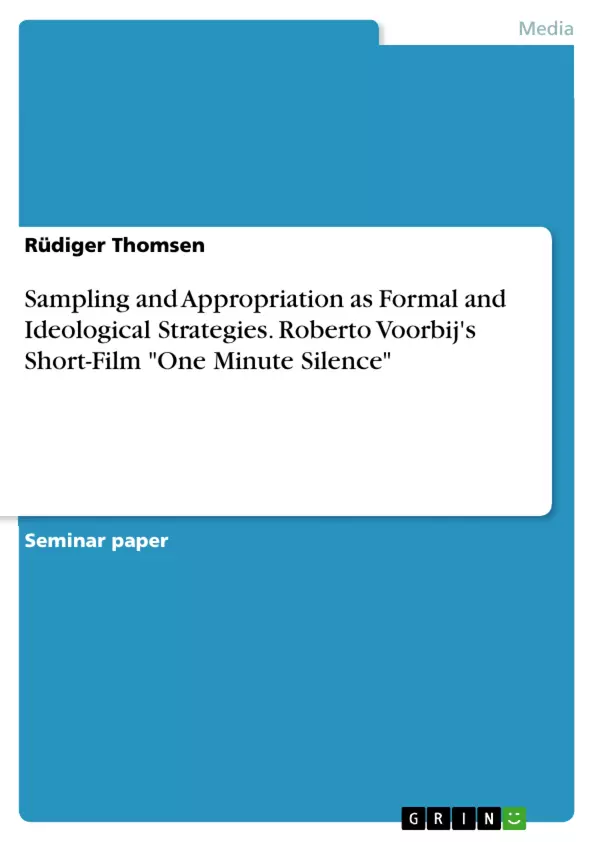This is the second paper in a series of studies on Remix Culture, which applies the theoretical background of understanding remix and mashup to Roberto Voorbij's short film One Minute Silence in terms of its formal and ideological strategies.
The main focus of this paper will be on the ideological and political dimension of critical remix practices. It will focus on appropriation as the ideological strategy of certain remix practices. A working definition of appropriation will be derived from one of the most influential publications on the topic by Julie Sanders. This understanding of appropriation will then be contextualized in the field of remix studies.
Inhaltsverzeichnis (Table of Contents)
- Introduction
- Understanding Appropriation
- Sampling and Appropriation in Roberto Voorbij's One Minute Silence
- Formal Aspects: Sampling, Cutting, and Editing
- Ideological Aspects: Appropriation and the Politics of Silence
Zielsetzung und Themenschwerpunkte (Objectives and Key Themes)
This paper aims to analyze the ideological and political dimensions of critical remix practices through the lens of appropriation. The study focuses on Roberto Voorbij's short film "One Minute Silence," a remix of CNN news footage that utilizes silence and editing techniques to critically examine dominant media representations.
- Appropriation as a critical practice in art and its role in challenging dominant hierarchies.
- The relationship between sampling and appropriation in the context of remix studies.
- The political potential of remix practices in deconstructing mainstream media conventions and ideologies.
- The significance of silence and nonverbal communication in conveying emotion and challenging traditional news formats.
- The impact of editing techniques in creating a critical perspective on dominant media practices.
Zusammenfassung der Kapitel (Chapter Summaries)
The introduction establishes the framework for the analysis, building on previous research and outlining key questions about the relationship between original source material and its remix. The paper then defines the concept of appropriation and contrasts it with adaptation. It explores the historical context of appropriation as a counter-movement against dominant cultural narratives, particularly in postcolonial studies and feminist discourse.
The analysis of "One Minute Silence" delves into the film's formal aspects, highlighting the role of sampling, cutting, and editing techniques in creating a critical commentary on the news format. The paper explores how the film utilizes silence to expose the emotional responses of journalists and challenge the perceived objectivity of news reporting.
The paper further examines the ideological aspects of the film, arguing that "One Minute Silence" uses appropriation as a political strategy to challenge the assumptions and conventions embedded in mainstream media. It highlights the importance of critical remix practices in addressing power structures and the manipulation of information in dominant media landscapes.
Schlüsselwörter (Keywords)
Remix Culture, Appropriation, Sampling, Critical Remix, Mainstream Media, News Format, Nonverbal Communication, Silence, Editing Techniques, Political Mashup, Hegemony, Resistance.
Frequently Asked Questions
What is the focus of Roberto Voorbij's film "One Minute Silence"?
The film is a remix of CNN news footage that uses silence and specific editing to critique mainstream media representations.
How is "appropriation" defined in remix culture?
Appropriation is an ideological strategy where artists take existing material to challenge dominant hierarchies and mainstream narratives.
What is the difference between sampling and appropriation?
Sampling refers to the formal act of taking a piece of source material, while appropriation focuses on the ideological and political implications of that act.
Why is silence used as a political strategy in this remix?
Silence exposes the nonverbal emotional responses of journalists, deconstructing the perceived objectivity and authority of traditional news formats.
What are the formal strategies used in "One Minute Silence"?
The formal aspects include precise sampling, cutting, and editing techniques that create a critical commentary on the original footage.
- Quote paper
- Rüdiger Thomsen (Author), 2016, Sampling and Appropriation as Formal and Ideological Strategies. Roberto Voorbij's Short-Film "One Minute Silence", Munich, GRIN Verlag, https://www.grin.com/document/1158116



